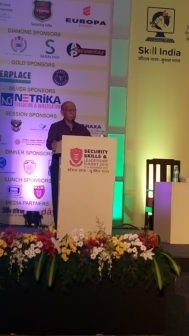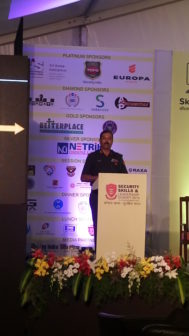Address by General JJ Singh, former Chief of Army Staff and Ex Governor of Arunachal Pradesh on “Security Paradigm in Smart Cities” called for retrofitting the existing cities into modern cities all the dimensions have to be included in the planning stage. General Singh spoke about the need to follow the best practices of the developed world to create smart cities. This needs proper planning, execution and integration of complex multidimensional cities with standard security, IT and communication and services and conveniences that need to be safeguarded under a master plan.
R K Sinha, Chairman of SIS Group and Member of Parliament, argued against the common perception that security persons are unskilled. He exhorted the audience to appreciate the multi-skilled tasks they perform: speak in many language, possess computer skills, attend telephone, make a gate pass – and hence they are superskilled! He commended the government efforts in skilling and entrepreneurship and said that for the first time we are able to recognize and honour the skills of security personnel. He re-emphasised on the need to increase the minimum pay to Rs 15000 with benefits and compliance for attracting more youth to join this profession.
Notes from the presentations by other speakers
Mr. Shekhar Dutt , former Defence Secretary and Governor of Chattisgarh – National Security Paradigm : 21st century India is on a path of development with 300 million youth; we can prosper if we go for manufacturing (currently 51% youth are in IT sector and only 15% in manufacturing). Security skills are required in every aspect of our lives for addressing internal and external issues. He insisted on a game plan for tackling issues like terrorism, left wing extremism and foresee the demand for trained security personnel.
 Mr. Ashok Soota, Executive Chairman – Happiest Minds Technologies Ltd. “Entrepreneurship Simplified”: Business of security is undergoing many changes and the pace of change will accelerate since it’s largely driven by technology. The talk was based on the recently launched book ,”Entrepreneurship Simplified”. Mr Soota spoke about the need for business Strategies while starting up as an entrepreneur in the security training and services was the main focus of this talk. Some the strategies discussed were, scale up strategy, competing against gorillas, pivoting strategy and risk minimisation strategy. Other points included:
Mr. Ashok Soota, Executive Chairman – Happiest Minds Technologies Ltd. “Entrepreneurship Simplified”: Business of security is undergoing many changes and the pace of change will accelerate since it’s largely driven by technology. The talk was based on the recently launched book ,”Entrepreneurship Simplified”. Mr Soota spoke about the need for business Strategies while starting up as an entrepreneur in the security training and services was the main focus of this talk. Some the strategies discussed were, scale up strategy, competing against gorillas, pivoting strategy and risk minimisation strategy. Other points included:
- Validate assumptions to adapt chosen idea (first time move, fast follower)
- Is the strategy disruptive?
- Are the planned differentiators real and defensible
- Price is not a strategy, it’s a mug game
- Use of technology in scaling up
Colonel Naresh Malhan: Future Trends in Security Space: Colonel Malhan’s presentation was about the evolution of professionalism in security sector. He described how “Chowkidaari” started getting outsourced and people from the Defence background started training them and how CAPSI brough tall private agencies under one umbrella and understood the requirements and brought recognition as an industry. He insisted on identifying and mobilizing the talent and training time, and with the help of the government, pay them better salaries. This will help in preparing smart guards using technology, who are trained and qualified to be a responder and who is well-acquainted with communication skills and crisis management. This is necessary because the scope of security services should change along with the new and emerging security threats. This brings in the need for change in security skills through:
- Design of entire security system along with the fire system
- The need to adjust, adapt, learn and apply knowledge and skills
- Dynamic training for the guards of tomorrow – the Smart Guards
- The Smart Guards would be tech-savvy, respond to alerts and take charge of the situation
 Colonel Vikas Bharadwaj : Preparing soldiers for a second career: He spoke about how skill development prepares soldiers for a second career. And, with 60000 troops retiring every year, every soldier becomes an asset to security industry and their unique Mission preparedness is a valuable asset. Skilling has to be outcome based with improved pay for entry-level jobs in security sector.
Colonel Vikas Bharadwaj : Preparing soldiers for a second career: He spoke about how skill development prepares soldiers for a second career. And, with 60000 troops retiring every year, every soldier becomes an asset to security industry and their unique Mission preparedness is a valuable asset. Skilling has to be outcome based with improved pay for entry-level jobs in security sector.
A soldier normally serves for 18 to 20 years and there are about 60000 people retiring between the age of 35 -40 years. They have many responsibilities and their civilian counterparts retire at 60 years . This “forced retirement’ driven by national security requirements can be utilized by private security services
- He also described in detail how the Directorate of Indian Army Veterans (regimental centers designated as training partners with NSDC) is one of the verticals into skilling is already contributing to training and empowerment.
- A prospective retiree should be imparted aspiration -inked skills and suitably placed prior to retirement. Thus harnessing innate potential in nation building and empowering them to lead a dignified life.
- Army veteran placement organization is engaged in 9 industry sectors in 19 job roles












